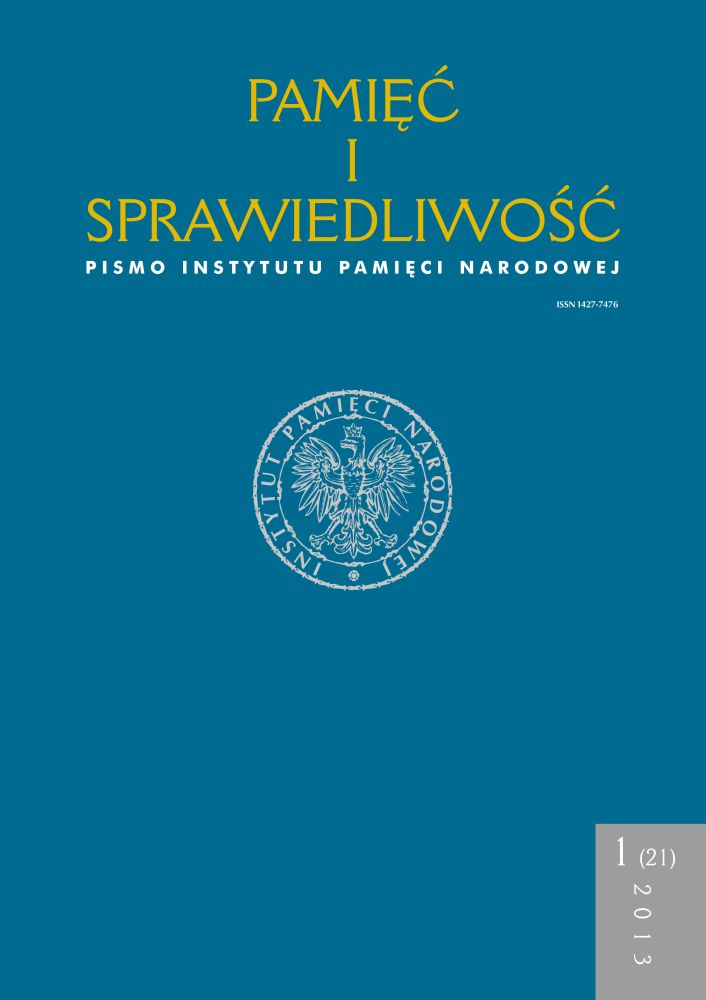Listy i skargi na działalność MSW w latach sześćdziesiątych, siedemdziesiątych i osiemdziesiątych XX wieku w analizach Biura Skarg i Listów MSW
Pamięć i Sprawiedliwość, V. 21 N. 1 (2013), pages: 83-103
Publication date: 2013-06-30
Abstract
Riferimenti bibliografici
A. Leszczyński, Sprawy do załatwienia. Listy do „Po Prostu” 1955–1957, Warszawa 2000 B. Gapiński, Sacrum i codzienność. Prośby o modlitwę nadsyłane do Kalwarii Zebrzydowskiej w latach 1965–1979, Warszawa 2008, Listy do I Sekretarzy KC PZPR (1944–1970), oprac. J. Stępień, Warszawa 1994, D. Jarosz, Akta Biura Listów i Inspekcji KC PZPR jako źródło do badań rzeczywistości społecznej w Polsce w latach 1950–1956, „Polska 1944/45–1989, „Studia i Materiały” 1996, nr 2, s. 191–199 D. Jarosz, Listy do centralnych instytucji państwa stalinowskiego jako źródło do badań życia codziennego w Polsce, „Kwartalnik Historii Kultury Materialnej” 1996, nr 3, s. 297-302. Supliki do najwyższej władzy, red. M. Kula, Warszawa 1996, R. Domke, Problemy społeczne Polaków w świetle analiz Biura Listów KC PZPR w latach siedemdziesiątych XX wieku, „Pamięć i Sprawiedliwość” 2011, nr (1)17, s. 353–370 Krzysztof Szwagrzyk, Listy do Bieruta. Prośby o ułaskawienie 1946–1956, Wrocław 1995,
Puoi leggere altri articoli dello stesso autore/i
- Grzegorz Waligóra, Andrzej Friszke, Jerzy Eisler, Konrad Rokicki, Łukasz Kamiński, Grzegorz Waligóra, [Dyskusja] Między Październikiem a Czerwcem. PRL 1956–1976 , Pamięć i Sprawiedliwość: V. 19 N. 1 (2012)
- Konrad Rokicki, „Język polski jest tak bogaty, giętka jest nasza mowa!” Podstawowa Organizacja Partyjna Oddziału Warszawskiego Związku Literatów Polskich i jej stosunek do polityki kierownictwa partyjnego w latach 1956–1970 , Pamięć i Sprawiedliwość: V. 19 N. 1 (2012)
- Konrad Rokicki, Chrzest bojowy ZOMO , Pamięć i Sprawiedliwość: V. 11 N. 1 (2007)
- Konrad Rokicki, Służba Bezpieczeństwa wobec inteligencji twórczej od Października ’56 do Marca ’68 , Pamięć i Sprawiedliwość: V. 10 N. 2 (2006)
 Język Polski
Język Polski
 English
English
 Deutsch
Deutsch
 Français (France)
Français (France)
 Italiano
Italiano
 Русский
Русский


 PDF (Język Polski)
PDF (Język Polski)
